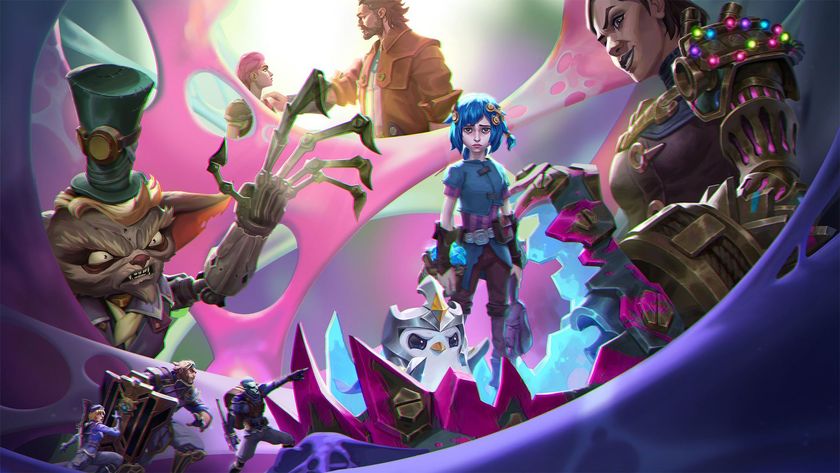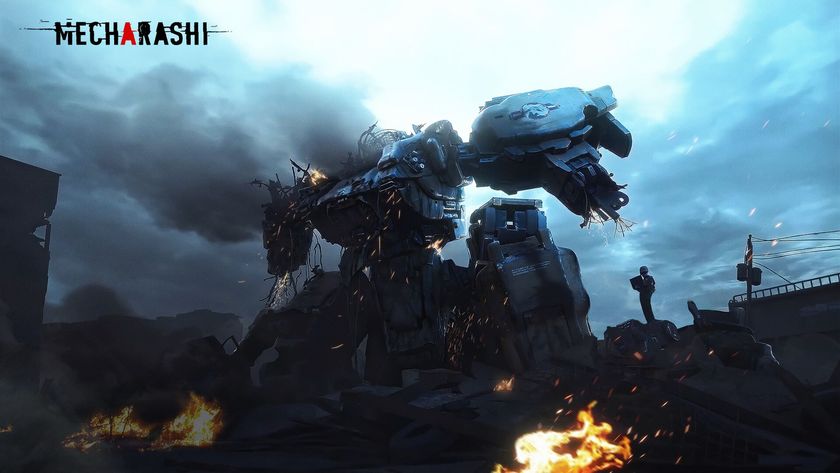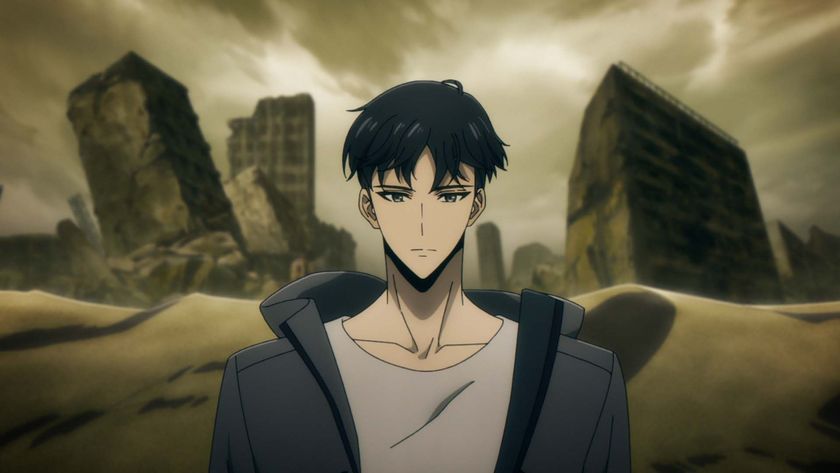Sins of a Dark Age - 9 ways it's unlike any other MOBA
Ganking noobs is only the beginning
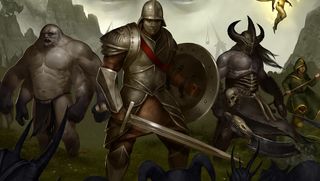
A new(ish) kind of MOBA
When we last saw Ironclad's Sins of a Dark Age, it was a totally original multiplayer game, mixing the most interesting elements of League of Legends with real-time strategy-style multi-unit control to create an utterly unique experience. We were excited about this breath of fresh air in the MOBA genre, but... well... it didn't work out. After months of work and hundreds of thousands of dollars were spent on this "Commander" system, Ironclad decided to drop it and move the game in a different direction--one that should be more familiar to fans of the genre.
That's not to say Sins of a Dark Age was bludgeoned by the generic bat, though. Though more similar to others in the genre, SODA still includes some wonderful ideas that look to move the MOBA forward, instead of entrenching it in the ways of old. Despite looking (and playing) like League of Legends and Dota 2, Sins of a Dark Age is unlike any game in the genre you've ever played.

Quests add a totally unique spin
Though matches progress in a fairly predictable fashion for the first few minutes (buy some items, head to lanes, insult your teammates), things get more interesting when Quests are spawned, forcing players to suddenly deal with something unpredictable in a genre built on predictability. Ironclad plans on having dozens of different Quests running on a rotation, with different objectives switching out every few weeks to keep things varied.
For example, one of the simple missions rewardings players with a buff for taking out a specific tower, shift the focus of the match entirely while it's active. That's just one instance, though--larger objectives will dynamically roll out as the game progresses. Needing to slay a troll guarding the middle of the map for its treasure (before bringing it back to base, capture the flag-style) created a massive group battle, whereas other quests opened new tactical routes for players. One assigned our heroes the role of dragon slayer, and gave each two archers to control in order to take the massive beast down. That's not all these units can do, though--we could take these archers down a lane and attempt to down some towers while the other team guns for the dragon.
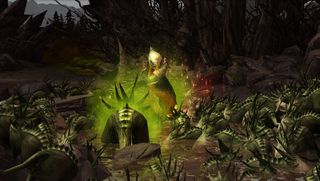
Interesting encounters are forced, and fairly regular
A majority of MOBA matches are spent in waiting for an opportunity to strike, biding time until the perfect moment for an explosion of action. These instances require player skill, and don't really happen by themselves. Sins of a Dark Age has some clever methods of forcing interesting encounters instead of simply waiting for them to occur.
It all goes back to the Quests, which adds incentive for random brawls to break out beyond happenstance. Being told to collect rat pelts in the jungle to give the enemy team a debuff means that its likely youll stumble onto an enemy group that's doing the same. Each quest is made specifically to spur the moments that make the genre sing, and if all goes as planned, you'll be involved in more memorable affairs than ever.
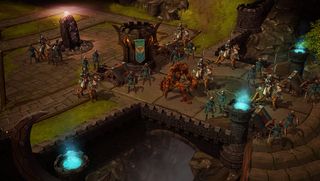
The day/night cycle is more important
Most MOBAs include some sort of day/night cycle, but none take it as far as Sins of a Dark Age. Jungle creeps are more aggressive when the lights go out, certain items are upgraded at night, and everything has reduced sight ranges when the sun isn't around to guide their path. The world's a much scarier place when the moon is on high, giving players interested in aggressive play some new strategic options.
Defensive play is buffed at night, too, but in different ways. New minions are spawned in lanes with improved sight ranges, incentivizing players to stick close to the new night watch. The largest, most noticeable change comes with the game's version of brush: Moonbloom. Though it still reacts the same way (hiding any heroes inside it), Moonbloom expands at night, changing the actual makeup of the map and forcing players to play differently.
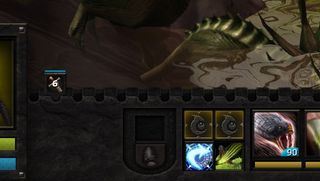
Glyphs are a nice upgrade from Summoner Spells
League of Legends players are familiar with "Summoner Spells," a suite of shared abilities that any player can take into battle, regardless of the champion they choose. Being able to teleport a short distance, heal, or do damage-over-time to an enemy spices up play and adds more customization. Though Sins of a Dark Age includes spells like these, they're handled in a different way: with purchasable Glyphs.
Players are given the option to purchase Glyphs with in-game money as soon as the match starts, adding more important choices for players looking to build their character. When starting off, do you opt to buy a strong offensive weapons, a speed boost, or an activatable ability? Better yet, these Glyphs can be upgraded during the match, giving players more tools at their disposal.

You have spots specifically for consumables
Nearly every MOBA since Defense of the Ancients has allowed players to purchase six items. Sins of a Dark Age is no different, letting you equip the typical suite of boots, weapons, and armor. Where it separates itself is with consumable slots, allowing players to carry two extra items in addition to the usual six. This might sound like a small change, but it's actually fairly significant for high-level play.
Usually, players need to abandon consumables near the end of the game in favor of equipping more powerful weapons. Problem is, placeable vision wards are too important to ignore, especially when MOBAs are played competitively--meaning one player needs to stay intentionally underpowered so that they're able to carry wards or other consumable items to help their team. By moving consumables to their own spot, players can fully equip themselves without sacrificing anything.
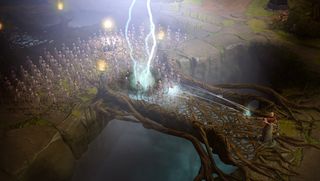
Last-hitting is less competitive, but still included
Some have complained that MOBAs are guilty of forcing teammates to compete against each other for "last hits," by rewarding players with bonus gold for being the last one to hit an enemy player or minion before death. There's obviously some tactical depth to this, and removing it entirely would strip that away. Sins of a Dark Age has an interesting solution that should allow the game to remain deep, without isolating new players who are uninterested in competing with their allies for maximum riches.
Getting the last hit on a minion or player still scores gold, but that gold is also shared with nearby heroes--rewarding everyone for cooperation in taking down enemies. The actual person to get the last hit is compensated at a higher rate to give some incentive, but giving everyone else gold too makes last hitting much less competitive (or selfish).
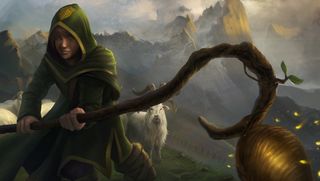
Leavers can be replaced with AI...
MOBA matches are long, and when you're losing by a landslide, it's hard to justify sticking around. Honest, upstanding members of society pull themselves up by their bootstraps and deal with it, sometimes pulling a victory out of nowhere. But the vile leeches that make up 1/10th of the MOBA community are not against peacing out when things go south. Since there are only ten people in an average MOBA match... well, you do the math. Sometimes people leave, and it sucks. Sins of a Dark Age has a few solutions.
One is to replace the fallen ally with an AI, puppeting their hero around and continuing to help the game progress. This isn't ideal--and the developers haven't yet decided when to trigger the AI-control instead of just waiting for the player to return--but it's an option, and might make casual matches more enjoyable.
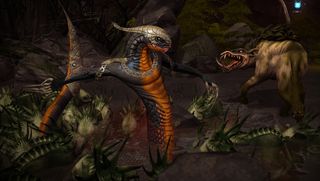
...or other players
The other, more awesome method of dealing with leavers is to allow other players to jump into their vacant seat. Again, the developers haven't yet decided when the game would cut off leavers from joining in favor of new players (a team vote was mentioned as a likely solution), but the system is already in place to make it work. Seriously, it's done--Ironclad just needs to decide exactly what they want to do with it.
Better yet, Ironclad actually has plans to reward players who act as saviors, jumping into games with leavers and helping lead that team to victory. This would help improve the community as a whole, and give those who step it up something special for their valor in battle.
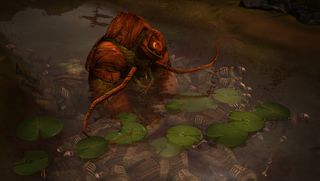
Accessibility is key
One reason for League of Legends' success is its accessibility. It's easy for anyone to jump in and play, and the barrier of entry is super low--especially when compared to Dota 2, the other side of the coin, which is a hardcore game for hardcore gamers that seems to focus more on competitive gaming than bringing new gamers into the genre. Sins of a Dark Age doesn't just want to continue in LoL's ease-of-access ways--it wants to go further with it.
Everything about Sins is engineered to be easy to understand, and the hand-holding nature of the game should make it easier to grasp for newcomers, while hopefully quelling the oftentimes volatile community. The quests force encounters to make the best parts of the genre occur more, and the basic gameplay was quick to learn. There's still strategic depth--oodles of it--but the fact that this is a pick-up-and-play game should help grow the audience.
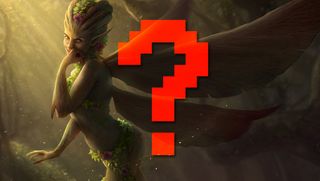
A new challenger appears
Sins of a Dark Age isn't due to release until later in the year, giving Ironclad plenty of time to add even more inventive elements into its MOBA. Considering how much has changed since we saw it last, the game might be totally different the next time it's shown off. But we're pretty happy with what we saw, and feel like it has what it takes to provide MOBA players with something unique.
And if you're looking for more, check out 10 games that prove originality is overrated and a debate on F2P and P2P.

Hollander Cooper was the Lead Features Editor of 12DOVE between 2011 and 2014. After that lengthy stint managing GR's editorial calendar he moved behind the curtain and into the video game industry itself, working as social media manager for EA and as a communications lead at Riot Games. Hollander is currently stationed at Apple as an organic social lead for the App Store and Apple Arcade.
